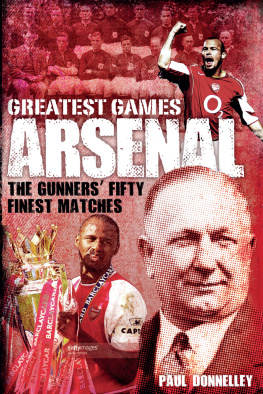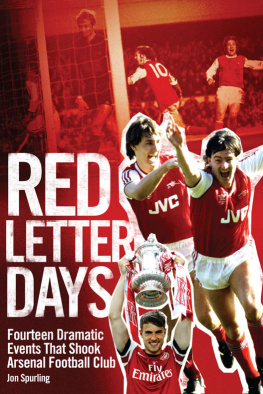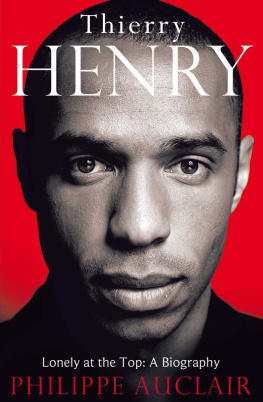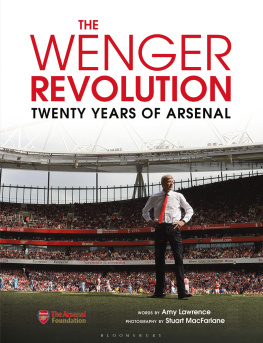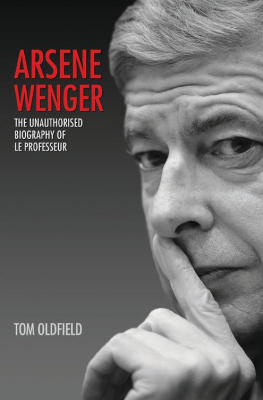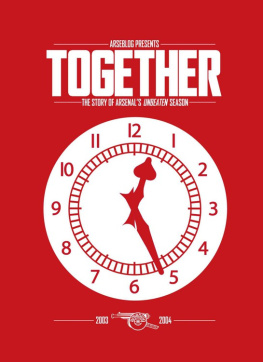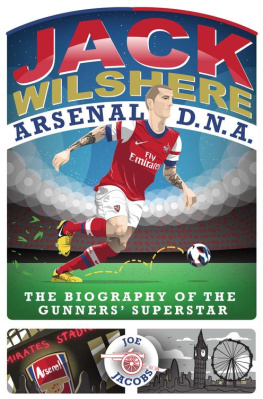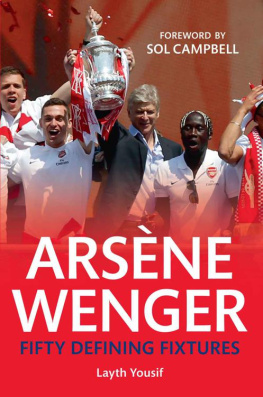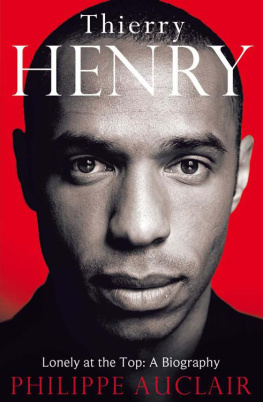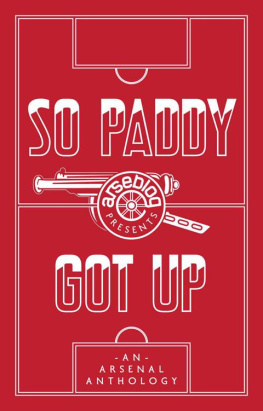ARSENE WENGER
First published in Great Britain by Simon & Schuster UK Ltd, 2015
A CBS COMPANY
Copyright 2015 by John Cross
This book is copyright under the Berne convention.
No reproduction without permission.
All rights reserved.
The right of John Cross to be identified as the author of this work has been asserted by him in accordance with sections 77 and 78 of the Copyright, Designs and Patents Act, 1988.
Simon & Schuster UK Ltd
1st Floor
222 Grays Inn Road
London WC1X 8HB
www.simonandschuster.co.uk
Simon & Schuster Australia, Sydney
Simon & Schuster India, New Delhi
The author and publishers have made all reasonable efforts to contact copyright-holders for permission, and apologise for any omissions or errors in the form of credits given. Corrections may be made to future printings.
A CIP catalogue record for this book is available from the British Library.
Hardback ISBN: 978-1-4711-3791-4
Trade paperback ISBN: 978-1-4711-5339-6
Ebook ISBN: 978-1-4711-3793-8
Typeset in Caslon by M Rules
Printed and bound by CPI Group (UK) Ltd, Croydon, CR0 4YY

Simon & Schuster UK Ltd are committed to sourcing paper that is made from wood grown in sustainable forests and supports the Forest Stewardship Council, the leading international forest certification organisation. Our books displaying the FSC logo are printed on FSC certified paper.
Football is a comfort, even through the hard times in life.
My dad introduced me to football, Arsenal and the love of the game.
When Arsenal were losing the FA Cup final 2-0 to Hull in May 2014, I could almost my hear my dad who passed away just two days earlier look down in exasperation and say: Cant you do this for me just this once?
Of course, Arsenal did it for him. And the magical part about Arsene Wenger is that he has done it so many times for so many people.
I couldnt have done this book without the support of my family. I would like to dedicate it to my dad. I miss talking to him so very much.
CONTENTS
INTRODUCTION
A RSENE WENGER IS HARDLY a run-of-the-mill football manager and the Frenchman is proud to be different.
As if to prove it, on Monday, 1 September 2014, Wenger flew with agent Leon Angel to Rome for a charity football match. While the rest of football was glued to a telephone or watching transfer deadline day unfold on television, Wenger went to the Vatican to meet Pope Francis.
Arsenal chief executive Ivan Gazidis was desperately trying to complete a deal to sign Danny Welbeck from Manchester United. Gazidis was struggling to get hold of his manager on the phone and eventually he got through to Angel, only to be told that Wenger was talking to the Pope. Later in the day, the Welbeck deal was completed and Wenger got his man. But it just goes to show this is no ordinary football manager.
Wenger does not like getting drawn into transfer auctions. He attended a convention in Geneva while Arsenal went on their crazy supermarket sweep on deadline day in 2011 and that perhaps illustrates where his priorities lie. He plays by his own rules, is determined to win with style, would rather shun the money-mad transfer market and yet always ensures that he and his own players get very well paid.
Wenger breezed into Arsenal, the most English of football clubs in 1996, as a relative unknown but soon established himself as a genius, a football revolutionary. The beautiful style of his teams, combined with his charm and unexpected wit, was destined to make him one of the Premier Leagues all-time greats and the most successful manager in Arsenals long and illustrious history.
When Wenger arrived, Manchester United were reigning champions, Newcastle their closest challengers. Arsenal had finished fifth the season before under Bruce Rioch and Wengers greatest achievement over the next two decades was to bring trophies and a consistency that would ensure standards would never drop as low again.
Wenger delivered a style of football and quality of player which had rarely been seen at Arsenal before. He introduced new training methods, new diets and mastered the French transfer market. His brilliant one-liners ensured he made the headlines, and his jousting with Manchester United boss Sir Alex Ferguson both on and off the pitch established one of English footballs great rivalries.
But, just at the time Arsenal were breaking records and enjoying the most successful period in the clubs history, they were hit with a double whammy which would push the club to the brink and test Wengers management skills to their very limit.
Roman Abramovichs Russian revolution bankrolled Chelsea from 2003, while Manchester Citys new-found wealth also emerged as a major factor in the Premier League, just at a time when Arsenal were having to borrow heavily to move to the Emirates Stadium. Wenger was left fighting with both hands tied behind his back and yet continued to deliver Champions League places every year, challenged for the title and, by 2015, had emerged out the other side, winning back-to-back FA Cups to become the first post-war manager to win the trophy six times.
Wenger still does not like spending stratospheric money, as he calls it, but two world-class signings in Mesut Ozil and Alexis Sanchez have helped change Arsenals dynamic, ambition and outlook.
Perhaps more than any other recent big game, Wenger was able to bring it all together in the 2015 FA Cup final when they beat Aston Villa 4-0. The mixture of pace, power and movement showed Arsenal at their best. They had struggled under the pressure of expectation, the slow, heavy Wembley pitch and being favourites in previous games against Wigan, Hull and Reading. But here, finally, was what Arsenal were about under Wenger.
Ozil glided across the pitch, Sanchez revelled in the big-match occasion, Santi Cazorla orchestrated the play, while Theo Walcotts pace stretched Aston Villas defence to its limit. Arsenal didnt just win, they won with style, which is so important to Wenger. There is always a debate in football about whether it really matters how you win just as long as you win. Pragmatists such as Jose Mourinho or Rafa Benitez put winning before everything and, when they are lifting trophies, that seems to be all that matters. But Wenger believes it goes deeper than that and, talking in May 2015, he gave a fascinating insight into why he believes it is important to entertain as well as win.
Lets not forget you can win and lose playing with different styles, said Wenger. I believe the big clubs have a responsibility to win but to also win with style. I believe our sport has moved forward a lot on the physical side, tactical side but we must not forget the values that it carries through the generations. One of them is the vibe coming out of the team going into the stand doesnt lie.
I always like to think that the guy who wakes up in the morning after a hard week of work has that moment, that fraction of a second, when he opens his eyes and says: Oh, today I go to watch my team. I like to think it makes him happy, he thinks he can maybe see something special. We cant guarantee that, but we have to try... Its amazing the effect you can have on peoples lives.
That seemed to come together again in 2015. There have been many highs and some lows during Wengers reign at Arsenal. The Premier League and FA Cup Doubles in 1998 and 2002, followed by the history-making Invincibles season in 2003/04 when they won the title unbeaten, were some of the best moments.
Next page

